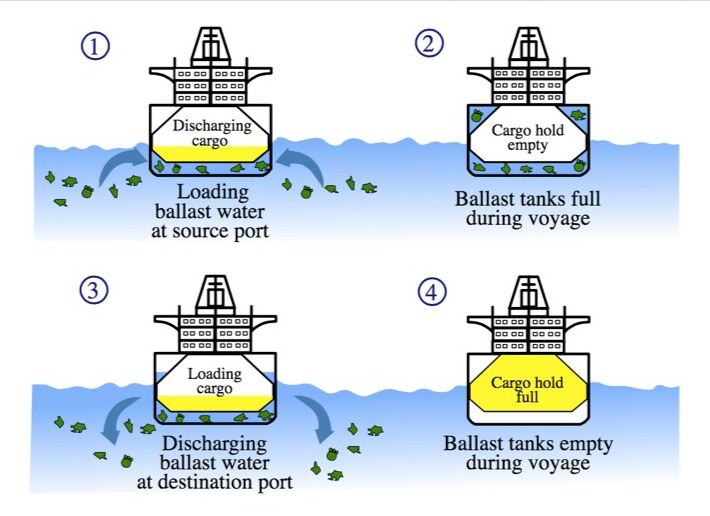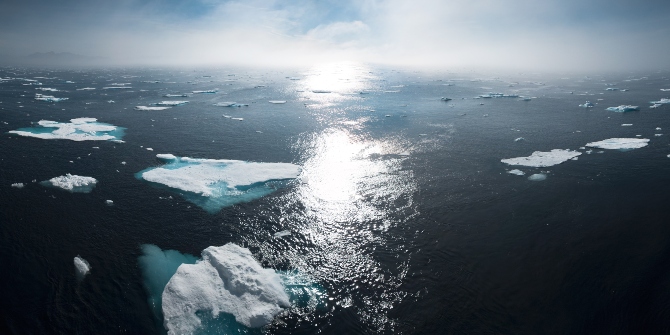Maritime shipping is the transmission belt for the global economy, carrying 90 percent of global trade. It plays a fundamental role in the growth of the world economy. However, it is also a major contributor to global environmental change through a diversity of issues from oil spills, CO2 and other air emissions, to invasive species, disposal of hazardous material and noise. While shipping has held a reputation for being the ‘greenest’ form of transport, this is now under challenge.
Shipping shares environmental challenges with many onshore industries, but it has been late in addressing these issues. Moreover, maritime environmental protection standards on air emissions (such as particulate matter and sulfur oxides), invasive species and disposal of hazardous material are lower than in onshore industries. Finally, shipping is expected to increase CO2 and other air emissions significantly in the coming decades due to an increase in demand and long ‘life-span’ of ships.
We examine the causes for the lagging status of shipping’s environmental protection.
Shipping is inherently multi-jurisdictional and particularly ‘footloose’ due to the mobility of ships. This challenges regulation for higher environmental protection standards. Seeking to lower their costs, many ship owners ‘flag out’ (register in a different country) and many open ship registers tend to attract ship-owners with promises of low regulatory burdens.
The International Maritime Organization (IMO) has the authority to provide global regulatory cohesion for shipping. It has a United Nations mandate to ‘create a regulatory framework for the shipping industry that is fair and effective, universally adopted and universally implemented.’ However, the development and adoption of IMO standards has been slow and far from universal. In response to weak IMO leadership, regions have acted unilaterally. The EC is pursuing a mandatory scheme for monitoring, reporting and verification of CO2 emissions, and the US has unilaterally regulated ballast water treatment.
Illustration: ballast water tanks – used to stabilise a ship when the cargo hold is empty
Note: this illustration was not provided by the authors. See full credit in the notes below
Environmental issues in shipping are wide ranging with inverse relationships in terms of their mitigation (e.g., ballast water treatment will increase CO2 emissions and energy consumption). The heterogeneous nature of these environmental problems, from human health and invasive species to global climate change, challenges regulatory alignment.
With the exception of oil spills, where shipping has improved its track record historically, environmental issues in shipping generally have low public visibility. The link between shipping and the environmental problems – although clearly documented by research – may be less intuitive to the general public. Low public visibility has contributed to low public interest.
Finally, shipping has been characterized by low cooperation between stakeholders, and shipping companies have usually pushed back on new regulation. However, there is a recent shift with some major shipping companies now coming together (such as the Trident Alliance) to encourage strong enforcement for a level playing field. Global climate change mitigation has become a particularly pressing regulatory issue. During the period 2007-12, shipping accounted for an average of 2.8 percent of annual, global CO2 emissions. In the coming decades the IMO proposed carbon reduction regulatory initiatives are expected to only slow growth in emissions, which are actually expected to rise in absolute terms due to a forecasted global rise in demand for shipping. To achieve absolute emission reductions, far more radical initiatives are required.
Lagging international environmental shipping regulation has opened up a governance space that companies themselves are stepping in to fill. Cargo-owners such as large brand companies are beginning to demand improvements in environmental performance from their carriers; and recently there is a rise of voluntary green shipping rating schemes such as the Clean Cargo Working Group (CCWG), the Forum for the Future’s multi-stakeholder Sustainable Shipping Initiative (SSI), the Clean Shipping Index, Right Ship, and port incentive programs for green ships (such as the Green Award scheme). These programs are global and provide environmental goalposts, tools for measuring and accountability, comparative benchmarks, as well as deliberative arenas for industry to debate and chart a possible new course. Although still small, membership and interest is growing. For example, the CCWG membership now represents over 80 percent of global container capacity. Although faced with challenges of accuracy and consistency of data and rankings, these private efforts constitute an important emerging mechanism in the global environmental governance of shipping.
Given the transnational nature of shipping, its long history of self-regulation, and the difficulties of fragmented governance that it faces, it is likely that private governance of environmental issues will establish a foothold rather than lessen. This in turn we argue, creates a challenge and opportunity for the IMO to respond to growing expectations to strengthen its regulatory role and influence by overseeing and orchestrating these emerging new private regulatory initiatives to ensure policy alignment and accelerate effective environmental progress.
♣♣♣
Notes:
- This article is based on the authors’ paper ‘Orchestrating Transnational Environmental Governance in Maritime Shipping’, Global Environmental Change 34 (3025) 185-195.
- This post gives the views of its authors, and not the position of LSE Business Review or the London School of Economics.
- Featured image credit: Ship tracks left in the atmosphere NASA’s Earth Observatory CC-BY-2.0 Inside llustration by original author Maxxl² , derivative work by Thorsten Hartmann GFDL or CC-BY-SA-3.0 via Wikimedia Commons
 Jane Lister is Associate Director and Senior Research Fellow, with the Sauder School of Business Centre for Transportation Studies at the University of British Columbia. Her research focuses on maritime environmental governance and Corporate Social Responsibility.
Jane Lister is Associate Director and Senior Research Fellow, with the Sauder School of Business Centre for Transportation Studies at the University of British Columbia. Her research focuses on maritime environmental governance and Corporate Social Responsibility.
 René Taudal Poulsen is Associate Professor, Department of Innovation and Organizational Economics at Copenhagen Business School and is an associate with CBS Maritime. His research is focused on business strategy and energy efficiency in maritime shipping.
René Taudal Poulsen is Associate Professor, Department of Innovation and Organizational Economics at Copenhagen Business School and is an associate with CBS Maritime. His research is focused on business strategy and energy efficiency in maritime shipping.
 Stefano Ponte is Professor, Department of Business and Politics at the Copenhagen Business School, and Co-Director, CBS Sustainability Platform. His research focuses on multi-stakeholder private initiatives in global sustainability governance.
Stefano Ponte is Professor, Department of Business and Politics at the Copenhagen Business School, and Co-Director, CBS Sustainability Platform. His research focuses on multi-stakeholder private initiatives in global sustainability governance.







They who pay the piper call the tune
The shortcomings of IMO are easy to understand when one looks at the way it is funded. IMO’s activities are mainly funded through annual contributions of its member states. The contributions are based on a formula which is different from that used in other United Nations agencies. The amount paid by each member state depends primarily on the tonnage of the fleet registered under its flag. Other sources of revenue comprise donor contributions and commercial activities. In 2014 the total contributions of the member states amounted to GBP 30.2 million.
IMO has 171 member states. It is disturbing to learn that in 2014 only ten of them – less than 6% – accounted for 64.7% of the total contributions of the IMO member states. In terms of deadweight tonnage (dwt), 68.8% of the world fleet is registered under the flag of these ten IMO member states.
Five of IMO’s ten largest contributors (Panama, Liberia, Marshall Islands, Bahamas and Malta) are the world’s main ‘flags of convenience’ (FOC). More than 98% of the dwt registered under their flags belongs to foreign owners with no genuine link to the flag state.
The share of ships operated under open registries and FOC grew substantially since 1980 – from 25% in 1980, 55% in 1995 and more than 75% in 2014. The usage of a FOC refers to a national beneficial owner choosing to register one or more vessels in another nation in order to avoid higher regulatory and manning costs, lower taxes and reduced operating expenses.
The FOCs have undermined global shipping pollution control and safety efforts. The vast majority of FOC registries do neither have the resources and infrastructures nor the required technical and management capacities to properly regulate and control their huge fleets. Furthermore, because of their dependence upon registry income, these states do not have the inclination to rigorously prevent and punish pollution and safety infringements of their multinational clients.
In 2014 the contributions of the world’s five main FOC countries – together with the accumulated contributions of several minor FOC countries – account for more than 50% of the total IMO member state contributions. This gives them unproportional voting and veto powers in the general assembly and technical committees of IMO where the international safety and environmental regulations, convention and standards are decided upon. It also explains IMO’s stance on climate change and its refusal to cap global shipping emissions and why the ratification and implementation of important environmental and safety conventions are often delayed for decades.
Kind regards
Uwe Breitling
Port, Transport & Training Consultant
Apartado 732 – 1200 Pavas
San José, Costa Rica